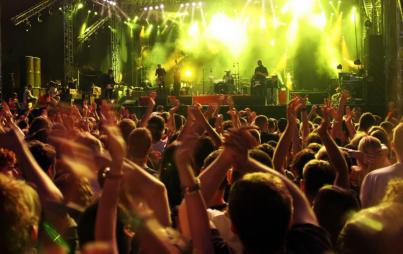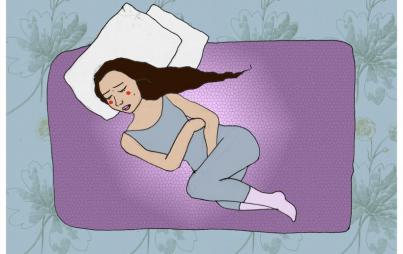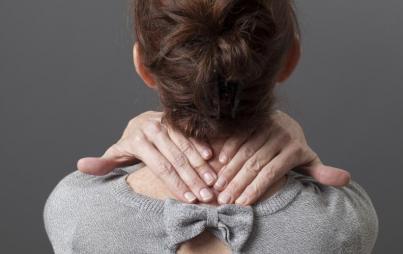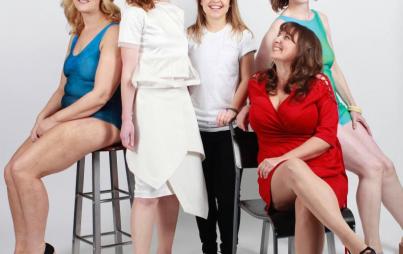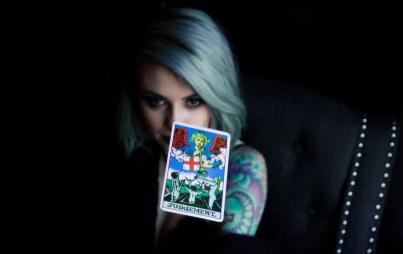
“The people who are not your allies are the people who actively fight against inclusion; but people who maybe use the wrong wording or are insensitive on accident, you can work with those people.”
There are few feelings better than experiencing a piece of art for the first time and realizing that it will stay with you forever. Watching Gaelynn Lea's Tiny Desk Contest submission was one of those moments for me.
The video opens with just Gaelynn's left hand visible from the edge of the shot, as she begins to play the first in a series of atmospheric loops on her violin. The camera pans out as she begins to sing, and the live loop she works into her music perpetuates that gorgeous hook throughout the rest of the song.
Gaelynn plays her violin upright, similar to the traditional form of a cello player, having learned to play as a child born with Osteogenisis imperfecta (commonly called Brittle Bone Disease).
When she finished playing, I hit repeat.
Needless to say, Gaelynn won the second annual NPR Tiny Desk Contest, and recorded an absolutely incredible Tiny Desk Concert as a result. Her Murder of Crows bandmate, Alan Sparhawk of Low, joined her partway through the concert, and she told the story of how they met and collaborated in their hometown of Duluth, Minnesota. I watched the concert, cried through every song, and immediately emailed her to ask if she'd be interested in an interview.
We talked about her music, her unique looping technique, and how she's using the Tiny Desk Contest to launch larger discussions about accessibility and advocacy for people living with disabilities.
Already an established musician and activist, Gaelynn has an incredible body of work that I've been blissfully combing through ever since that first play of “Someday We'll Linger In The Sun.”
I can't wait to see (and hear!) what else she has in store.
♦♦♦
Could you explain the difference between fiddle and classical violin technique?
Classical violin technique is almost always utilizing sheet music, where it's all written out and you play it exactly like it is on the page — and a lot of the time it involves going up really, really high on the violin.
Traditionally, fiddle music, though, was passed down by ear, so that you can learn them without sheet music. Generally, they are accessible to everyone — there aren't super high notes played very often, and they repeat a lot.
They were used in old time dances back when people didn't have computers. They would hang out by dancing, so the music that you learn for fiddle traditionally would be what people would dance to.
You play traditional fiddle music, but you use a live loop, right? How did you develop that? The technique is so cool and the way that you go about it is unlike anything I've heard before.
I got the looping pedal from Alan Sparhawk [of Low], and in our band, Murder of Crows, he does the looping. I play the harmony that I hear from the loops that he creates.
About two or three years ago, he gave me a looping pedal and said, “I think you might have fun playing with. Just get used to it, and someday maybe you can do shows by yourself,” because I had never done any solo shows before.
I was thinking, Yeah, right. I never want to do shows by myself.
When I started experimenting with the looping pedal, one thing I noticed was that fiddle tunes really do work well because the chords are often repeated. I don't know, it just seemed to fit. There's an A part and a B part, but they usually complement each other. For most fiddle tunes you can lay down a basic loop, and it fits the whole sound.
Then also you can really get experimental with it. You play the melody, of course, but then you can change the tempo or play a harmony part to it. There's a lot you can do. It was a natural way for me to get used to looping on my own.
It just is neat to me that these tunes have been around for so long — 200 years in a lot of cases — and to reinvent them in a way that's not really being done, as far as I can tell.
What's so cool about it is that you're playing these old tunes and you're giving them this really modern spin that somehow elevates them instead of completely changing them.
I know that there is a section of musicians who really don't like to see their tunes changed, but I feel like... It's not so experimental that you don't know what you're listening to.
If you're a traditional fiddler you'll recognize the melodies for sure, but it just seems like a way to not just recreate what's been done for 200 years, but still hearken back to it. I don't know. I think it's really fun.
I love playing my own music, and I really like playing with Allen, but I genuinely also enjoy the fiddle tune part of it. I don't see myself just stopping that. It kind of happened as an accident because it was a familiar way to get used to looping, but really now I just actually like it because you can do so much, and every song is so different — just fun, fun to do.
You do a lot of accessibility and disability rights activism. Does that ever interact with music?
I was always feeling like there wasn't a lot of compassion from my caseworkers [for people with disabilities who were seeking support]. It's like they assume that you're lying.
It's really hard, because I have always tried really hard to be honest about what I'm doing with caseworkers... I'm able to work, so I always have worked. I don't think I'm freeloading or anything, or, like, cheating the system.
I decided to sign up for a three-hour seminar, which seems kind of crazy, but I was like, “I bet I'll find three hours of things that we can talk about.” I presented there. It was very comprehensive because it was so long. It took a long time to prepare for it.
All of a sudden I had all this material that was written, and I actually did a survey of people with disabilities. It's still up on my website for people to access.
I had a lot of data actually collected, so I was like, “Well, I could start saying that I'm advising, and if anyone wants to have at least some Disability 101 or accessibility training, even trainings about compassion, I could do that.”
People started hiring me and I got more and more comfortable with it. I realized that if I play at the end, it's like a time to have people reflect on what they just learned at the very end of the speech. So I usually play at least two songs at the end of every time I go and present. It's just done really well, and I realized as an adult that disability is just not talked about very often in our society, especially not in the mainstream media. If it is, a lot of times, it's pity-based. It's not very empowering.
I'm hoping to do some traveling so I can spread that message of just compassion and disability awareness and maybe highlight some of the barriers that still exist that people don't really think about.
People don't think about simple things like physical accessibility for wheelchairs and things.
Oh yeah.
If nobody knows about accessibility barriers with disability or any kind of chronic health issue, you can't be mad.
You can be mad on a level, like, Why doesn't anyone know? But you can't be mad at the person because they just don't know, and something that's come from the Tiny Desk Contest it being able to like bring up more of these types of conversations.
I wasn't expecting that. I wasn't expecting to win! It's awesome to me because it is important to me that we talk about disability rights and accessibility, because people are generally good. It makes me think about the way that we finally made same-sex marriage legal. You know what I mean? People finally heard about it enough times where it became a priority.
Disability is still so far out of that conversation realm, so we need to do anything we can do to put it in people's minds more, so that things start changing, because I really think people are good enough, generally. Change could happen, but if nobody knows what's around then they can't change it.
Yeah. I'd have to agree with you. When people find out I do a lot of mental health activism, and they don't understand or have never heard of something — those interactions are almost overwhelmingly positive. When it's just someone who's like, “I didn't know that. Could you tell me about that?” Every time, I'm so happy to, because someone walks away from that conversation with something new, and it's one more person who knows something.
It's a little bit like this little conference that I was at. All the terminology was the things that you hope not to hear: “confined to a wheelchair,” and “suffers from,” “a victim of.” What else? “You're so inspiring.”
That kind of stuff happened a lot, but I spoke, and I made sure in the conference to — as compassionately as possible — talk about why that kind of language is not positive, and why we need to leave words like that out of the dialogue about disability because it's not empowering.
What was interesting is they did receive that really well. They were like, “I never thought about it.”
You're like, “What?! How did you never think about that?”
On the other hand, they're not my enemies, because they're trying. They want to learn. They were there, and their minds were open to at least some new perspectives, and they were really happy to know. I think they felt kind of bad, like, “Oh, we didn't know that was bad.” You can't be mad at those people.
The people who are not your allies are the people who actively fight against inclusion; but people who maybe use the wrong wording or are insensitive on accident, you can work with those people. They're not the enemy. They just need to be educated.
It was eye-opening to realize that we can talk, like, “Oh, man, how did they not know,” but still not be mad at them. It's about how they respond when they learn.
Gaelynn is performing all over the country right now, including some great venues in The Bay! Check out her Facebook page to learn about where you go hear her rad music, and let us know if you love it as much as we do.
Header image: Niki Walker and Kara Frame/NPR.


